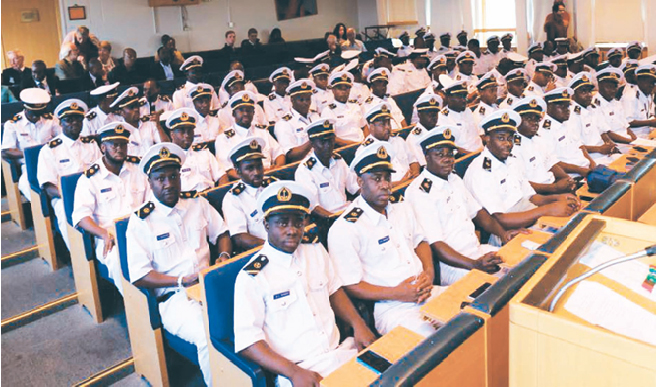
The Nigerian Seafarers Development Programme (NSDP) was designed as an interventionist programme for youths to develop interest in shipping and also to provide a pool of seafarers that will fill emerging vacuum, especially, the indigenous manning requirements of Coastal and Inland Shipping (Cabotage Act).
The NSDP was borne out of the need to harness the country’s opportunity of being a coastal nation and its endowment, with a vibrant and energetic youth population and turn them into concrete economic benefits for the country and its people.
The objective is specifically to invest heavily in the training of Nigerian youths aged between 17 and 22 years to acquire both theoretical and practical skills and hands-on knowledge in internationally recognized maritime institutions around the world for the purpose of having a rich pool of operational and officer cadre seafarers, with attendant economic benefits to the country.
When the NSDP was conceptualized, it was explained as the way out of the inadequacies of existing and ageing pool of seafarers.
It was designed to be funded partly by the state governments of the prospective seafarer and
Good as the intentions of the programme was, it has been marred controversies. There have been allegations such as underpayment of the allowances of the cadets, breach of contract between NIMASA and the training institutions.
Recently, there was an allegation of such abuses by an institution in India. This allegation, which bordered on gratification was brought to the attention of the Attorney General of the Federation. This development has led to a chain of events which have culminated into a query to NIMASA from the Ministry of Marine and Blue Economy.
This is the first time that the programme will embarrass the mother-agency to the point of earning an official query.
Prior to the present, the NSDP had serially embarrassed the country, as its cadets have at different times either publicly demonstrated against the programme, or have been involved in various infractions and misdemeanour.
Variously, cadets have either raised alarm that the tuition fees were not paid, or that they were not able to proceed on the mandatory sea time owing largely lack of funds or availability of vessels.
Shockingly, some Nigerians ship owners have rated the NSDP-trained cadets very low in competence and employability. They specifically alleged that majority of the foreign cadets could not measure up when put side-by-side with those trained at the Maritime Academy of Nigeria in Oron, Akwa Ibom state.
Some stakeholders in the Nigerian maritime industry have equally said that such foreign training is in a way de-marketing the competence of Nigeria’s local maritime institutions thereby impeding the global relevance of Nigerian-issued certificates.
We also recall that, during a visit to Nigeria in 2023, the International Transport Workers Federation (ITF) dropped a bombshell. Speaking through its Africa Regional Secretary; Mr Safiyanu Muhammed, the global body tactically queried the essence of the huge amount that has been devoted to the training of budding seafarers under the National Seafarers Development Programme (NSDP).
The ITS submitted that despite spending more than N16 billion on training of over 2000 seafarers over the years, under the National Seafarers Development Programme, there is nothing to show for it. The NSDP beneficiaries are not feasible in Nigeria or globally.
In a veiled reference to the NSDP, the ITF Scribe expressed dismay that in the past, Nigerian government had invested in training hundreds of seafarers, but their current whereabouts and employment status were unknown.
We recall with shame that about four years ago, some embattled Nigerian youths who were beneficiaries of the National Seafarers Development Programme (NSDP) took to the streets in Manila, Philippines. Their grievance was that they were allegedly abandoned by the Nigerian Maritime Administration and Safety Agency in Philippines.
In the video that went viral, the cadets alleged that they had been abandoned by NIMASA, even as they said that they had been in that country for about 10 years.
The Nigerian cadets under the NSDP were seen protesting at the Nigerian Embassy in Manila Philippines, over alleged refusal by the Embassy to listen to and receive them and address their grievances against NIMASA.
That was not the first time that the NSDP would be openly rubbished. We recall that, in September 2018, some cadets of the programme who had been sponsored by NIMASA, stormed the agency’s head office in Apapa, Lagos to protest a three-year delay in sending them on a mandatory sea time training that will make them certified sailors.
The peak of the protest was when they pointedly accused the agency of siphoning the fund earmarked for their training. Surprisingly, NIMASA never reacted to that weighty allegation.
Currently, there is yet another scandal involving the powers-that-be at NIMASA over alleged graft-seeking from a NSPD-accredited institution in India.
The NSDP story is (indeed) not a pleasant one. Apart from stories of cadets being abandoned without funding and upkeep, there are stories of those who have graduated are yet to secure sea time, while those who have managed to secure sea time could not find a job! There are some cases of cadets who have made a success of the NSDP, but it is either that their number is insignificant or they are non-existent.
The NSDP may be a well-intentioned idea, but its implementation is faulty and gives little hope. Going by the multifaceted ills, Nigeria can not wishfully want the NSDP to launch it to the status of leading supplier of seafarers in Africa.
Yes, NIMASA says with the NSDP, the growing army of unemployed and restive youths would be professionally trained and groomed to provide the much-needed capacity for the maritime industry. Yes, we agree that these youths are being trained, but they are largely jobless. Of what use is the training that offers no jobs thereafter.
Having implemented the NSDP since 2008, it is obvious that it is ripe for a review. Part of the review that we advocate is such that the sea-time component is embedded in the programme from the start. With this, there will be no waiting time by the cadets. The students will learn for a period to be determined by the institutions, and be engaged on sea-going ships before going back to school to complete their programme. Government should also securitise the allowances payable to the cadets.
Also, NIMASA will need to rejig the funding arrangement. It is obvious that NIMASA can no longer continue to cough out that chunk of foreign exchange to fund the NSDP. Perhaps, the sharing formula for funding needs to be reviewed, between the states of origin of the cadets, NIMASA and perhaps, the cadets themselves.
We also think that NIMASA may need to reduce the number of beneficiaries to a manageable size. This is to enable proper monitoring.
Finally, we urge NIMASA to look in the direction of the Maritime Academy of Nigeria (MAN), Oron in Akwa Ibom state for the NSDP. This is because the Nigerian nautical institute in Oron has been upgraded and can now compare with its contemporaries elsewhere.
Most importantly, products of the NSDP must be gainfully employed. Only then can it be said to be a success. For now, it is safe to say the NSDP is a huge failure.















